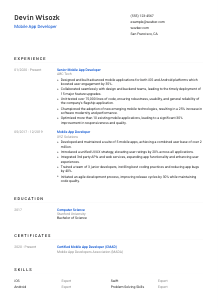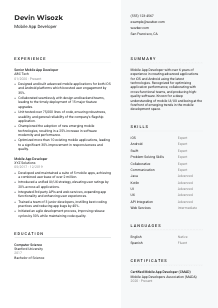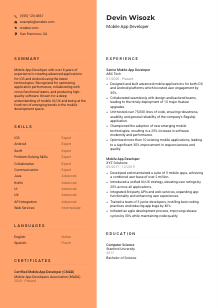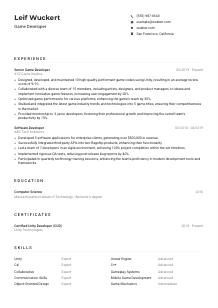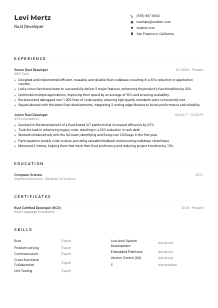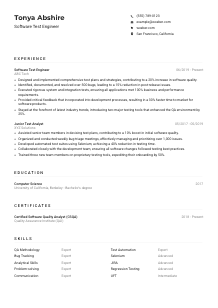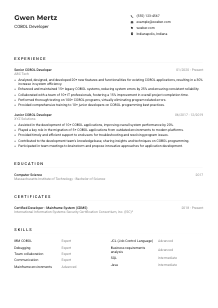Mobile App Developer CV Example
Crafting code for apps, but your CV doesn't compute? Navigate this Mobile App Developer CV example, formulated with Wozber free CV builder. Grasp how to integrate your app wizardry into the job's algorithm, making your career journey as seamless as scrolling through a well-designed interface!
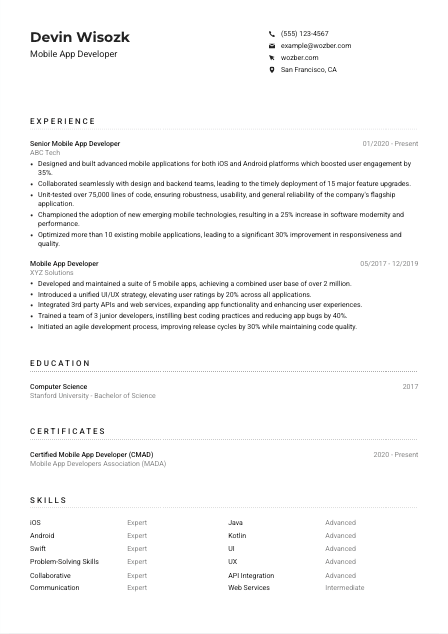
How to write a Mobile App Developer CV?
Hello, aspiring Mobile App Developer! Ready to bridge the gap between your coding skills and your next dream job? Your CV is the key, and with the guidance of Wozber's free CV builder, we'll ensure it's not just any key, but a master key designed specifically for the lock that is your desired job.
This guide dives deep into crafting a tailored CV for the Mobile App Developer position, focusing on ATS optimisation to make sure your CV doesn't just reach human eyes but impresses them. Let the coding begin!
Personal Details
First impressions matter. Here's how to own your introduction in the Mobile App Developer world.
1. Brand Yourself with Your Name
Think of your name as the app icon on a phone screen; it needs to be noticeable. Ensure it's in a clear font, perhaps a bit larger than the rest of your CV text. This is where you start building your brand.
2. Reflect the Role
Following your name, immediately state that you're a 'Mobile App Developer.' This is crucial for matching the job title and sets the hiring manager's expectations from the get-go.
3. Essential Contact Info
Include your phone number and a professional email. Imagine this as the user agreement phase where you provide clear and functional contact details ensuring the employer can easily connect with you.
4. Location Matters
Being in San Francisco, CA, as per the job requirement, gives you a geographical edge. Highlighting your location upfront meets one of the employer's logistical preferences.
5. Digital Presence
If you have a Github or LinkedIn profile showcasing your projects or professional network, adding it here is like integrating an essential API into your app – it enhances functionality and shows your active involvement in the tech community.
Takeaway
Your Personal Details section is the app splash screen to your professional world. Make sure it is welcoming, precise, and impeccably aligned with the Mobile App Developer role. Think of it as the first user interaction with your professional persona.





Experience
Showcasing your development journey.
- Designed and built advanced mobile applications for both iOS and Android platforms which boosted user engagement by 35%.
- Collaborated seamlessly with design and backend teams, leading to the timely deployment of 15 major feature upgrades.
- Unit‑tested over 75,000 lines of code, ensuring robustness, usability, and general reliability of the company's flagship application.
- Championed the adoption of new emerging mobile technologies, resulting in a 25% increase in software modernity and performance.
- Optimised more than 10 existing mobile applications, leading to a significant 30% improvement in responsiveness and quality.
- Developed and maintained a suite of 5 mobile apps, achieving a combined user base of over 2 million.
- Introduced a unified UI/UX strategy, elevating user ratings by 20% across all applications.
- Integrated 3rd party APIs and web services, expanding app functionality and enhancing user experiences.
- Trained a team of 3 junior developers, instilling best coding practices and reducing app bugs by 40%.
- Initiated an agile development process, improving release cycles by 30% while maintaining code quality.
1. Break Down the Specs
First, dissect the job description. Identify key experiences they're looking for, such as working with iOS and Android platforms, or integrating third-party APIs.
2. List Your Roles
Arrange your work history starting with the latest role. Layout your job title, company name, and the period you were employed, similar to versioning in app updates; it shows the progression and current status.
3. App Features as Achievements
Explain your contributions and achievements in each role like releasing app features. Were you part of a team that launched an application? Did you improve app performance? Quantify these achievements to showcase your impact.
4. Quantify Your Success
Just as app analytics are vital, so are numbers in your CV. Enhance your accomplishments with data like 'Increased user engagement by 35%' or 'Reduced app load time by 20%.'
5. Relevance is Key
Curate your experiences to align with the job. If you worked on a revolutionary feature or overcame a significant coding challenge, those are your headline updates. Remember, relevance trumps quantity.
Takeaway
Your experience section is like the app store description of your professional life. Make it so compelling and relevant that the hiring manager can't wait to download your capabilities into their team. Highlight your achievements, and always focus on the impact you've made.
Education
Your foundational code.
1. Target Degree Requirements
The job seeks a 'Bachelor's degree in Computer Science, Engineering, or a related field.' Ensure your highest, most relevant degree is listed first, matching the job's essential requirements.
2. Simplify Your Listing
Organize your education section cleanly: degree, field of study, school name, and graduation date. Think of it as the clean user interface of an app; it should provide essential information at a glance.
3. Match Degree to Job
Directly list the required degree if you have it. In this example, 'Bachelor of Science in Computer Science,' perfectly aligns with the specified educational requirement, making you a stronger candidate.
4. Relevant Extras
Completed any courses or projects that directly apply to mobile app development? Include these but be concise. It's like adding those extra features that give your app the edge over competitors.
5. Other Achievements
For early-career developers, other educational highlights such as honors, clubs, or significant projects can be valuable. For senior roles, focus more on higher education and continued learning relevant to your career path.
Takeaway
Your education section underpins your technical foundation. It's your proof of understanding the complex world of mobile app development. Frame it to resonate with the job's requirements, showing you've got the theoretical knowledge to back your practical skills.
Certificates
Extra credentials for your CV app store.
1. Analyze the Job Blueprint
The job description didn't specify certain certifications but showcasing relevant ones, such as a 'Certified Mobile App Developer,' signals ongoing learning and expertise which is a hidden requirement in the tech world.
2. Refine Your Selection
Only list certifications that add value to your application as a Mobile App Developer. It's akin to otimizing your app's performance by removing unnecessary code; focus on what enhances your candidacy.
3. Date Matters
For technology roles, where skills evolve rapidly, adding the acquisition date of your certifications can be beneficial. It shows you are up-to-date with the latest trends and technologies.
4. Commit to Continuous Integration
The tech landscape is ever-changing. Demonstrate your commitment to professional growth by pursuing and listing new certifications relevant to mobile app development. It shows you're not just keeping up but striving to be at the forefront.
Takeaway
Certificates are like trusted plugins that enhance your app's functionality. Similarly, they enhance your CV by adding credibility and showing your dedication to your craft. Choose wisely and update regularly.
Skills
Your professional API endpoints.
1. Decode the API Documentation
Scour the job description for essential skills. Explicit skills like 'iOS/Android development' or 'Swift, Java, Kotlin expertise' are your primary endpoints, while implicit ones like 'problem-solving' and 'collaboration' are equally important.
2. Prioritize Direct Matches
Highlight skills that directly align with the job description. This demonstrates that you not only understand the technical requirements but that you're capable of fulfilling them.
3. Organize for Clarity
Keep your skills section clean and straightforward. Separate your technical skills from your soft skills, and order them by relevance. This shows the hiring manager at a glance that you have the right tools for the job.
Takeaway
Think of your skills section as your professional toolbox. Each skill is a tool that's been carefully chosen for its utility and relevance to the job at hand. Keep updating and refining this toolbox, ensuring it's always ready for the challenges of modern mobile app development.
Languages
Speaking the global code.
1. Check the Compiler
The job highlights the 'Proficiency in English language for professional communication is essential.' Ensure your proficiency level in English is clear, listing it as 'Native' or 'Fluent' as appropriate.
2. Main() and Additional
Just as in coding, where you have a main() function and additional libraries, prioritize English and then list other languages you're proficient in. Even if not mentioned in the job description, additional languages show global awareness.
3. Clearly Define Proficiency
Be honest about your language proficiency levels. Using terms like 'Native,' 'Fluent,' 'Intermediate,' and 'Basic' helps the hiring manager understand your communication capabilities accurately.
4. Global Reach
For roles that may involve global teams or markets, showcasing multilingual skills can be a significant asset—even if not explicitly asked for. It's like supporting multiple platforms; it vastly increases your app's user base.
5. Translate Your Abilities
View each language as a framework or library that can help in different scenarios. Understanding when and how to use them can set you apart in a competitive job market.
Takeaway
Languages enhance your CV by showcasing your ability to operate in diverse environments. Just as a well-designed app communicates effectively with its users, fluency in multiple languages speaks volumes about your ability to engage in a global workplace.
Summary
Capturing your essence in a snapshot.
1. Understand Your Unique Selling Points
Begin by absorbing the essence of what makes you an exceptional Mobile App Developer. What unique achievements or skills do you possess that make you stand out?
2. Craft a Compelling Introduction
Open with a bold statement about your career and passion for mobile app development. This is your headline, make it catchy and reflective of your professional journey.
3. Echo the Job's Language
Weave in key requirements from the job description into your summary. Show how your experiences and skills directly address what they're looking for in a Mobile App Developer.
4. Conciseness is Key
Your summary should be a blend of your professional identity and how it aligns with the role. Keep it concise, aiming for 3-5 impactful lines that invite the reader to dive deeper into your CV.
Takeaway
Your summary sets the tone for your professional narrative. Think of it as your app's loading screen: make it engaging and reflective of the valuable content that follows. This introductory pitch is your chance to capture the hiring manager's attention, so make every word count.
Ready, Set, Develop Your Career!
With every section refined and every detail polished, you're now equipped to craft a Mobile App Developer CV that talks the talk and walks the walk. Using Wozber's free CV builder, including its ATS-friendly CV templates and advanced ATS CV scanner, you're now ready to write a CV that's not just ATS-compliant but captivating to every hiring manager who reads it. Your skills, experiences, and aspirations as a Mobile App Developer have been neatly packaged into a document that's as impactful and dynamic as the apps you dream of creating.
Now, it's time to hit 'deploy' on your career. Happy coding, and best of luck in your job search!

- Bachelor's degree in Computer Science, Engineering, or a related field.
- Minimum of 3 years experience in mobile app development (iOS, Android) using Swift, Java, or Kotlin.
- Deep understanding of mobile UI/UX standards and modern interfacing paradigms.
- Proficient in working with third-party APIs and web services.
- Strong problem-solving skills and ability to work in a collaborative team environment.
- Proficiency in English language for professional communication is essential.
- Must be located in San Francisco, CA.
- Design and build advanced applications for the iOS and Android platforms.
- Collaborate with cross-functional teams to define, design, and deploy new features.
- Unit-test code for robustness, including edge cases, usability, and general reliability.
- Stay updated on emerging trends and technologies to ensure the software remains modern.
- Optimize application performance, quality, and responsiveness.





